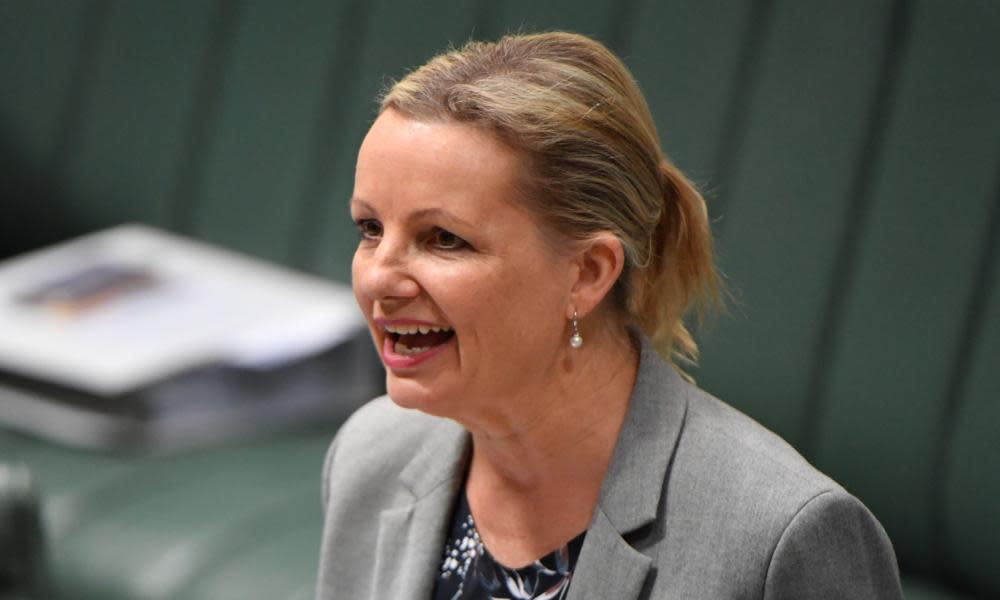Morrison government’s new environment commissioner ‘toothless’, conservation groups say

Conservation groups say a new environmental assurance commissioner proposed by the Morrison government would effectively be “toothless” because it would have no power to investigate individual decisions related to projects.
They also expressed concern that ministers would have the authority to make decisions that are inconsistent with new national environmental standards if they considered it in the public interest to do so.
The government has introduced a bill to set up a framework for environmental standards and an independent commissioner who would sit in the environment department.
Related: 'Development should stop': serious flaws in offsets plan for new western Sydney airport
It forms part of its response to the once-in-a-decade review of the Environment Protection and Biodiversity Conservation (EPBC) Act led by the former competition watchdog head Graeme Samuel.
The proposed assurance commissioner would be appointed by the governor general to monitor and audit the processes governments use to make environmental decisions and how well they are functioning.
“The environment assurance commissioner will not have a role in monitoring or auditing individual decisions,” the environment minister, Sussan Ley, told parliament on Thursday.
“It is not a second decision-making body and it isn’t a replacement for, or a precursor to, legal review processes for decisions.”
Under the legislation, the commissioner would be responsible for auditing and monitoring bilateral agreements that would allow state and territory governments to make environmental decisions under federal laws.
The bill expressly prohibits the commissioner from auditing individual decisions about developments or the environment and the commissioner would be required to prepare and submit a plan of work to the federal environment minister each year.
The government estimates the new role will cost $9m over four years but hasn’t made clear whether some of that money would be spent on employing additional staff to support the commissioner.
The model has been criticised by environment groups who said a commissioner needed to have powers to audit individual decisions to be able to determine whether national environmental standards were being properly applied.
“You don’t want legislation to limit a commissioner,” Rachel Walmsley of the Environmental Defenders Office said.
“You want them to be responsive and agile and able to look into specific issues.”
The Australian Conservation Foundation said while it welcomed the introduction of a commissioner, the government needed to address the flaws in its proposal before it tried to pass separate legislation to hand federal environmental decision-making powers to the states and territories.
“This is why a national EPA (Environment Protection Authority) would be a clearer, cleaner model,” chief executive Kelly O’Shanassy said.
Related: Australia urged to overhaul environment laws and reverse 'decline of our iconic places'
The legislation introduced Thursday also establishes a framework for proposed new national environmental standards, which would enable federal environment ministers to make and update standards and determine what decisions under national laws would be subject to them.
The centrepiece of Samuel’s 38 recommendations was the creation of a new set of national environmental standards focused on outcomes for the environment.
His report recommended that any move to transfer environmental approval powers be underpinned by standards that were legally enforceable and laid out a set of interim standards that should be immediately adopted.
Samuel’s standards detailed the environmental outcomes that Australia’s laws should achieve, including maintaining and improving environmental conservation; maintaining and improving habitat for all listed threatened species; avoiding destruction of habitat critical to the survival of endangered wildlife; and using environmental offsets only after all steps have been taken to avoid or mitigate environmental damage.
But the interim standards the government has adopted strip out these recommendations and instead mimic the existing failed laws.
The proposed legislation also creates a caveat allowing ministers to make decisions that are inconsistent with environmental standards if they consider it is in the public interest to do so.
Nicola Beynon, of the Humane Society International, said this loophole was concerning and poorly defined in the bill.
She said a caveat for “national interest” in the existing laws had been abused by governments to approve projects that would have an otherwise unacceptable impact on threatened wildlife and habitat.
“Weak standards and loopholes only serve to increase the grave risks of handing environmental approval decisions to states and territories,” she said.
Suzanne Milthorpe, of The Wilderness Society, said Samuel’s review highlighted two decades of failure by Australian governments to properly protect the environment.
She said if the government’s legislation represented a step towards implementing the full package of reforms proposed by the review, it would be welcome.
“But given we haven’t seen a full government response to the Samuel review and given the legislation itself looks pretty thin, we are deeply concerned that this might be simply a matter of political expediency aimed at helping pass the regressive EPBC devolution bill,” she said.
The final EPBC report also called on the government to create an independent office for environmental compliance and enforcement but the government has not yet acted on this or issued a full response to the final report and its recommendations.
The government’s standards bill will be subject to an inquiry by a senate committee which is due to report back in June.
Labor’s environment spokesperson, Terri Butler, said despite the vast amounts of money and time dedicated to the Samuel review, the government had ignored the substance of the Samuel report and “cherrypicked” from its recommendations.
“Scott Morrison’s low standards are on full display yet again, with the introduction of a second tranche of environment legislation which is inconsistent with the Samuel review,” she said.
The Greens environment spokesperson, Sarah Hanson-Young, said the government had “blatantly ignored their own expert’s recommendations and is instead taking a chainsaw to environmental protections”.
“They have absolutely no intention of reversing the unsustainable environmental trajectory Prof Samuel warned about in his once-in-10-year review,” she said.
“They haven’t even bothered to respond after more than 100 days sitting on the final report.”

 Yahoo Movies
Yahoo Movies 
